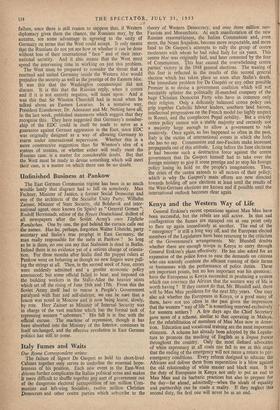Kenya and the Western Way of Life
General Erskine's recent operations against Mau Mau have been successful, but the rebels are still active. In that sad conflagration the flames are stamped out at one point only to flare up again immediately at another. The end of the " emergency " is still a long way off, and the European elected members of the Legislature have been returning to the criticism of the Government's arrangements. Mr. Blundell doubts whether there are enough troops in Kenya to carry through General Erskine's plans effectively. He has also asked for an expansion of the police force to ease the demands on citizens who can scarcely combine the efficient running of their farms or businesses with the performance of police duties. These are important points, but no less important was his question: have the Europeans in Kenya succeeded in producing a system which can convince the African that the western way of life is worth having ? If they cannot do that, Mr. Blundell said, there will be Mau Mau problems for the next fifty years. One may also ask whether the Europeans in Kenya, or a good many of them, have not too often in the past given the impression that the western " way of life "is something reserved exclusively for western settlers ? A .few days ago the Chief Secretary gave news of a scheme, similar to that operating in Malaya, for the rehabilitation of members of Mau Mau now in deten- tion. Education and vocational training are. the most important elements. A scheme has already been adopted by the Legisla- ture to promote the teaching of English as a lingua franca throughout the country. Only the most diehard advocates of white supremacy at all costs can fail to see at this stage that the ending of the emergency will not mean a return to pre- emergency conditions. Every reform designed to educate the Africans and deliver them from superstition is a blow against the old relationship of white master and black man. It is the duty of Europeans in Kenya not only to put an end to Mau Mau and its barbaric practices but also to prepare for the day—far ahead, admittedly—when the ideals of equality and partnership can be made a reality. If they neglect this second duty, the first one will never be at an end.


































 Previous page
Previous page